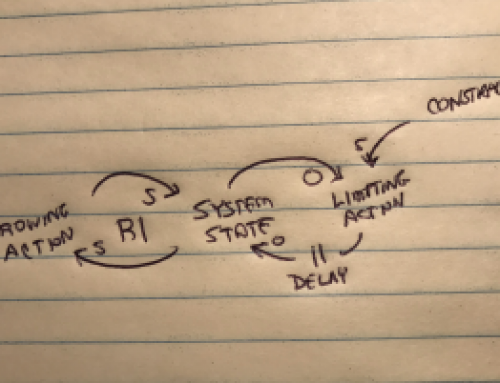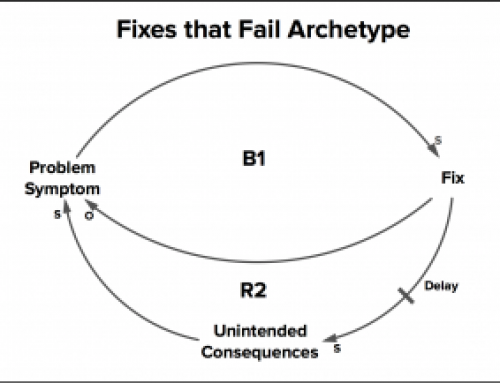There is no doubting the value of business intuition. We admire those in business that demonstrate uncanny intuition about next steps, new products, market trends, opportunities, and unforeseen roadblocks that mud be addressed. Every person demonstrates intuition in certain areas where that person has vast experience, intimate knowledge of certain situations, or key knowledge of how something should or does work. However, intuition alone can be extremely dangerous in the business world and, left unchallenged, may set a business on a path that proves less than competitive or innovative over time. In this first post addressing how to truly create competitive and innovative thinking in your organization, I want to explore how to maximize the use of intuition and how to avoid predictable pitfalls of the use of intuition.
The Origin of Good Intuition
As mentioned above, a person who demonstrates good intuition for specific situations likely has experience, intimate knowledge of specific situations and circumstances, or key knowledge about how something works. Experience is key driver, yet it is clear that experience must be qualified or this can lead to very limited amounts of intuition. Early in my first career, which was in the technology field, I worked with a group of software developers. One of those developers was a man named Bob. Bob had ten years of experience. However, I learned over time that Bob really had one year of experience ten times. Bob’s experience was based on the transfer of knowledge and skills from his predecessor and he simply repeatedly used what he knew over and over again without gaining new perspective, new ideas, new information, or new skills.
This is an extreme example, however, it points to the notion that there are many people you may encounter in business whose intuitions about the next steps, actions, or decisions, are based on a very limiting breadth of experience. When someone with a narrow breadth of experience only thinks intuitively, leaving that unchallenged is going to simply repeat “what we have always done.” There are sales people, marketers, even business leaders, that move from position to position repeating what they have done before “intuitively.”
Key knowledge of a situation or how something works is another key driver, but then again, should also be qualified. Just as Bob had a limited type of repeating experience, Bob also used the same knowledge repeatedly without searching for new information as it evolved. Given that Bob repeated the same practices of programming solutions over and over again, he simply failed to know that something could be done differently and even better. People get comfortable with what they know. People can feel safe in using what they know again and again and are perhaps even afraid of attempting to learn new things because of the anxiety of possible failure to adapt to new knowledge or use new knowledge. This can be another limiting filter on any intuitive power.
The key takeaway is that the foundation of intuition is built on a combination of experience and knowledge that (a) has a time-stamp in terms of the validity given how fast things can change, and (b) is related directly to one person’s view of their own experiences and knowledge. This means that those who rely heavily on intuition in business must either be the type of person that constantly evolves, learns, observes, and digests what is new around them or that this type of person must encourage and welcome challenges to their intuitions in order to constantly broaden their experience and knowledge and fully test the veracity of their intuition. Failure to test intuition on a regular basis creates risk of depending on thinking that is likely far less than competitive and innovative. Yes, there are a few exceptional people and moments in time where pure intuition seems to create amazing value and success, but likely those specific people involved honed and practiced the art of challenging their intuition through reflection and actual collaboration with others.
Integrating Intuitive Thinking into Competitive Thinking
Intuitive thinking plays an important role in what I refer to as competitive thinking, the full set of skills and activities required in business to stay competitive and innovative. Many times, it is intuitive thinking that first recognizes a need that is emerging or a potential pitfall. Intuitive thinking likely starts many brainstorming sessions. Intuitive thinkers often capture issues related to the bigger “systems” picture because of their unique ability to quickly and intuitively sense relationships of events and forces. All of these are significant and important roles for intuitive thinking in the collaborative process of competitive thinking. I want to examine some of the specific disciplines or skills that any intuitive thinker should learn and apply to ensure that their intuition is best used and integrated into the overall process of a greater collaboration of innovative thinking.
Force Yourself to Fill in the ..b..c..d..e.. of your Thinking
People who think intuitively always seem to go from “A” to “Z” quickly and likely communicate to others this way. Someone listening to an intuitive thinker just hears that they took in a set of information (“A”) and somehow reached their conclusion (“Z”). In fact, the actual intuitive thinker likely only recognizes that same “gut” feel answer unless that person forces himself/herself to go back and think through each thought transition and relationship in the process. This is vitally important for two reasons. First, an intuitive thinker needs to be able to follow his/her own logic in order to recognize possible connections or information that needs testing. Second, in a group setting, an intuitive thinker must be able to walk others through their thinking to build trust and understanding, and to give others opportunity to test specific connections and relationships in that thinking. When intuitive thinkers have the ability to clearly communicate how they moved from “A” to “Z” based on their internal sense of connections, the larger system, knowledge, and experience, that act of communication give other types of thinkers the hooks they need to best assimilate, support, or challenge ideas and improve the collaboration.
Welcome Challenges
That leads us to the next discipline or skill needed which is to welcome and accept all challenges. An intuitive thinker absolutely must be open to challenges. As we discussed, intuition is predicated on one person’s experiences and knowledge, and regardless of how much experience, tenure, knowledge, and certainly regardless of their position in the business, that person must be open to the possibility that different perspectives and different thinking styles may uncover something new to consider, reveal a change that was previously hidden from that intuitive view, or simply validate this intuition. The bottom line is that too many individuals dubbed as “leaders” believe that their intuition is blessed by their title and fail to challenge intuition to ensure that the most competitive thinking will be done. Some have fears well grounded in knowing that the value of their experience has faded in light of many changes. Some know they have not done their homework to think of real solutions based on valid evidence. Others just don’t value input because of they are the boss. Instead, everyone one of us, especially leaders, should remember that there is great strength and confidence shown in asking for input from others, earning the trust and respect of others who feel valued.
Avoid Shutting People Down
The last discipline or skill I want to suggest is to maintain a vigil on avoiding situations where you shut people down. As an intuitive thinker myself, I have had to come to terms with verbal and physical habits I have exhibited at times that shut people down. What are these? Verbally, you should avoid immediately responding with things like “that won’t work,” “I already thought of that,” or other phrases that seem to cut off the thinking of others in favor of your intuitive knowledge about the situation. Physically, intuitive thinkers may tend to act dismissive in subtle ways like losing interest quickly, visibly getting distracted, and dismissive gestures with your hands or eyes. Linear thinkers may give you anxiety as you listen to them spell out their argument and you have already jumped to the end. Stay engaged, ask questions, and listen for possible new information that might validate or add value to your intuition. Another great practice, especially for intuitive thinkers in a leadership position, is to avoid being the first to speak and offer a view or solution. Many times, because of the combination of intuitive thinking and a leadership position, others present will just assume this s a decision and not really a discussion.
Hard Work, but Worth the Effort
Ensuring that intuition is valued but also challenged is not easy work. The tips above may help you personally as an intuitive thinker or help you better understand and/or coach someone that is an intuitive thinker. What is supremely significant is for all involved to recognize that people think and learn differently and that it is important to ask people how they think and learn, recognize differences, and give everyone ample opportunity to express views, challenge assumptions, and generate powerful innovative thinking that is collaborative in nature, building good ideas into great ideas. Intuition is a great primer, and is likely the starting point for a great deal of competitive and innovative thinking, but it should not be the ending point, only one of the tools for collaboration.

